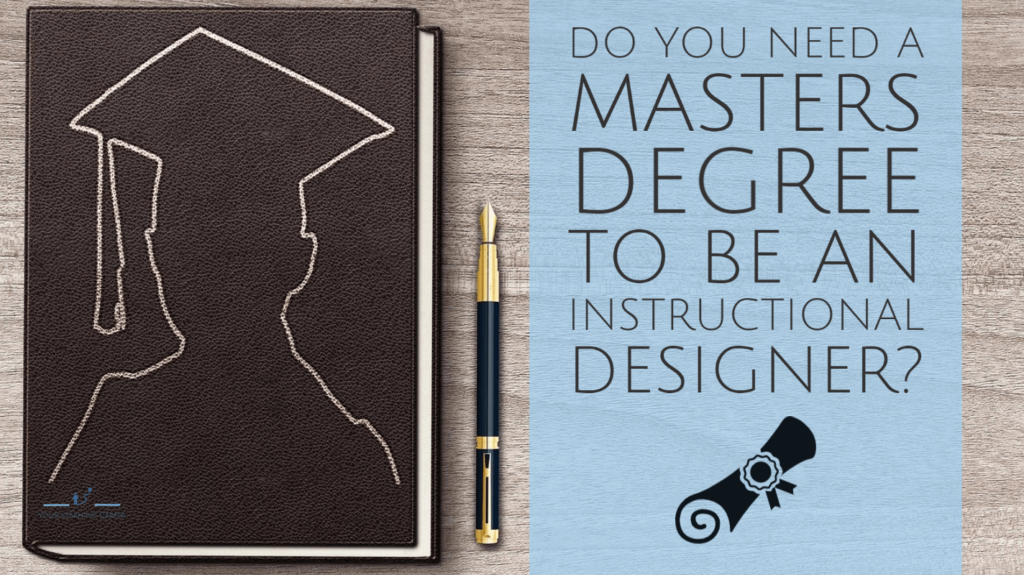I’ve noticed that there is a lot of interest lately in becoming an Instructional Designer/Learning Experience Designer and/or an E-Learning Developer. Maybe that’s just because I tend to follow a lot of ID related forums though. At any rate, a question I see that comes up quite a bit is whether or not a person should pursue a Masters Degree in order to get started as an instructional designer. (Or they ask it about getting into e-learning development which is usually a part of instructional design. I discuss each of these roles in more detail here and here.)
I understand why people ask this. Many people in the field DO have a Masters (myself included) and many of the job postings I’ve seen list it as a requirement. But do you really NEED one to get into the field? In my opinion and based on my own experience, no, you don’t. There are plenty of other ways to get experience and there are plenty of jobs that do not require it. I did instructional design in various capacities for about 15 years before I got my Masters. When I did decide to pursue the Masters, it was a personal choice and not due to any requirement or pressure from anyone. Was it worth it? Yes, for me it definitely was. But, as I said, it is a personal choice that you will have to make for yourself. In this article, I am going to share some questions you should ask yourself along with my experience which will hopefully help you as you embark on your own career path.
What types of Jobs are you interested in?
The first question you need to answer is what kind of “instructional design” job are you really looking for? I put that in quotes because a lot of different tasks get dumped into the “instructional designer” title. I talk about this more here. Do you want to solely focus on e-learning development? Do you want to focus solely on instructor-led courses? Do you want to do both? Do you want to mix in some facilitation? Corporate? Higher Education? Non-Profit? Entry level? Senior level?
These are all factors on whether or not a Masters may be required. If you are looking at more Senior level jobs, then, chances are, the Masters will be a more frequent requirement. Same with jobs in Higher Education. Otherwise, when I go and do a quick job search on Indeed, I’m not seeing a lot that require more than a Bachelors.
Are there opportunities to get experience where you are now?
You don’t have to have the title “Instructional Designer” to do instructional design or e-learning work. I have only held the formal title for the past 4 years but I’ve been doing it for about 20. Some of my job titles included “Training Specialist”, “E-Learning Specialist”, “Staff Development Specialist” and “Training and Development Specialist” to name a few. Every one of them involved instructional design work and e-learning development.
If you are in a non-training related role, don’t fret. You can still find opportunities to get experience. If your company has a training department, that could be a good place to start. You might see if there is some project that you could help with using your subject matter expertise. For example, if you are in a sales role you might offer your assistance with any sales training that might be in development. Or, you could offer it in your own department. Maybe you can create a short instructional video or job aid that could help people in your department. That’s what I did in my first job out of college and I didn’t even know I was doing a form of instructional design. When I worked in the Character Department at Walt Disney World, my supervisor asked me to create a training video about how characters can seem scary to little kids. I wrote a script, filmed and edited it. We then used the video as part of the training for new cast members in the department. So, even though I didn’t have a formal training role, I now had a legitimate example of training that I had developed.
What Qualities do you want from a Masters Program?
When I started looking into Masters programs, I got a little overwhelmed. There were a lot of different programs offering a lot of different experiences. Some were on campus, some were online, some were a hybrid. Some were Master of Arts others were Master of Science and some were Masters of Education. There are also different focuses – some were more teacher/educator focused while others had more of a corporate flavor. And then there were the costs. One program I had inquired about sounded really good. But then when I saw the cost – I think it was around 30 grand – I had heart palpitations.
After a while of aimlessly looking at different programs, I finally got focused. I thought about and wrote out what I really needed and wanted from a Masters Program. For me it was:
- Affordable – My company at the time had a tuition reimbursement program which would cover up to $2500 per year. That’s not a lot to work with but it’s better than nothing. That narrowed my choices fairly significantly as I searched. The program I found ended up being in state and had a scholarship for Texas residents that I applied for each semester. That gave me 3 hours free each time. When all was said and done, I think I still ended up paying a little bit out of pocket but most of the cost was covered by my company and that scholarship.
- Flexible – As I mentioned, this was mid-career for me so I had my full time job as well as a family with two young kids. I needed something that would fit my schedule which led me to look for online programs that had evening class sessions.
- Focused on ID Fundamentals AND Technology – At that point in my career, I knew that my main interest was in learning technologies. I was doing a lot of e-learning development and I loved creating the courses as well as any graphics, video and audio that went with it. I also recognized the importance of having solid instructional design to go along with the courses I was building.
Once I had narrowed down these requirements, it got a lot easier to find the right program for me. You may have totally different criteria which is perfectly fine. Just make sure you do take some time to think about what the program needs to have before taking the leap.
What are you hoping to achieve with a Masters?
Will it get you a promotion? Does your “dream” job require it? Will you gain skills you don’t have or can’t get anywhere else? Will it make you feel better about yourself? There really isn’t a wrong answer here…well, except “I saw someone post on Facebook that I need one”…
For me, it was about career growth. I knew it would definitely help me in my position at the time and, I thought that if I ever were to go work somewhere else, it would only make me more valuable there. That proved to be true. It definitely gave me a lot of great information and experience that I was able to use on the job. And, when I ended up pursuing other opportunities, I landed a significantly higher paying job as a full time senior level I.D. Of course, it wasn’t just the Masters that got me the job but it was listed as a requirement in the job posting.
My Masters Program
I mentioned what I was looking for and what I gained from getting my Masters degree but I haven’t really talked about the program itself. The program I landed on after looking around and researching was with the University of Texas at Brownsville. It has since changed names to University of Texas Rio Grande Valley . There is a Master of Education in Educational Technology which is what I got. There are also some certificate programs in Online Instructional Design, E-Learning, and, Technology Leadership. They even have a Doctoral Specialization in Educational Technology. I don’t think I’m quite ready for that just yet but it’s cool that it’s available. I think the certificate programs could be a great place for someone to start if they weren’t sure about doing the full Masters. The classes are some of the ones you would take for the Masters so you could always go back and do the Masters later having already completed those.
For me, this program was exactly what I was looking for. It was affordable as well as high quality. It was 100% online as well. Not only was that beneficial from a flexibility standpoint, it also let me see first hand how effective online learning can be. A lot of students are experiencing subpar online learning experiences right now because so many schools were caught unaware and had to scramble to put something together due to the pandemic. It’s a shame because, when done right, it really can be a great experience. UTRGV does it right. I felt like I was always able to communicate with my professors when I needed to. I also had plenty of opportunities to collaborate and work with my fellow students. I was introduced to a multitude of technologies and got to practice using them. Because it was aligned with what I was already doing, I was able to use real work projects for some of my class projects (with both my boss and professor’s blessings). At the end, I had an e-portfolio which I could use to showcase my work. All in all, a very good experience and, as I said, well worth it for me.
Conclusion
Do you need a Masters Degree to become an Instructional Designer? As I stated, I don’t think you do. Can there be benefits? Certainly. Just make sure to do your homework and find the program that’s going to best meet YOUR needs.


Pingback: Career Spotlight: How to Become an E-Learning Developer - Your Learning Career
Pingback: 9 Pro Tips For How To Get Experience in Instructional Design - Your Learning Career
Pingback: 9 Pro Tips For How To Get Experience in E-Learning Development - Your Learning Career
Pingback: Career Spotlight: How to Become an Instructional Designer – Your Learning Career
Nice to read up here on your blog Jeff I got 2 Master’s degrees one is in EdTech got it before Facebook and the smartphone but what do you recommend to “refresh” my skills so I can enter instructional design field. I have previous experience as an instructional designer so what essential software do you recommend besides the ones on your YouTube videos?
Hi Phil! Thanks for reading!
A couple of things that come to mind as far as getting yourself refreshed in instructional design would be to check out any ID offerings through ATD (Association for Talent Development) – I know they have some certificate programs but I’m thinking they may also have some one off courses that would be good/helpful. Langevin Learning also has several courses. I mention them because that is who I took my first ID class with many, many moons ago and they appear to still be going strong.
As far as software besides the e-learning authoring tools I mention on YouTube, the big ones (at least in my experience) are Microsoft Office – especially PowerPoint and Word. Also video editing and audio editing. I like Camtasia (video) and Audacity (audio).
I’d also add things like Zoom, Webex and Microsoft Teams if you plan on creating online instructor led courses.
Hope that helps!
Pingback: 9 Pro Tips For How To Get Experience in Corporate Training – Your Learning Career